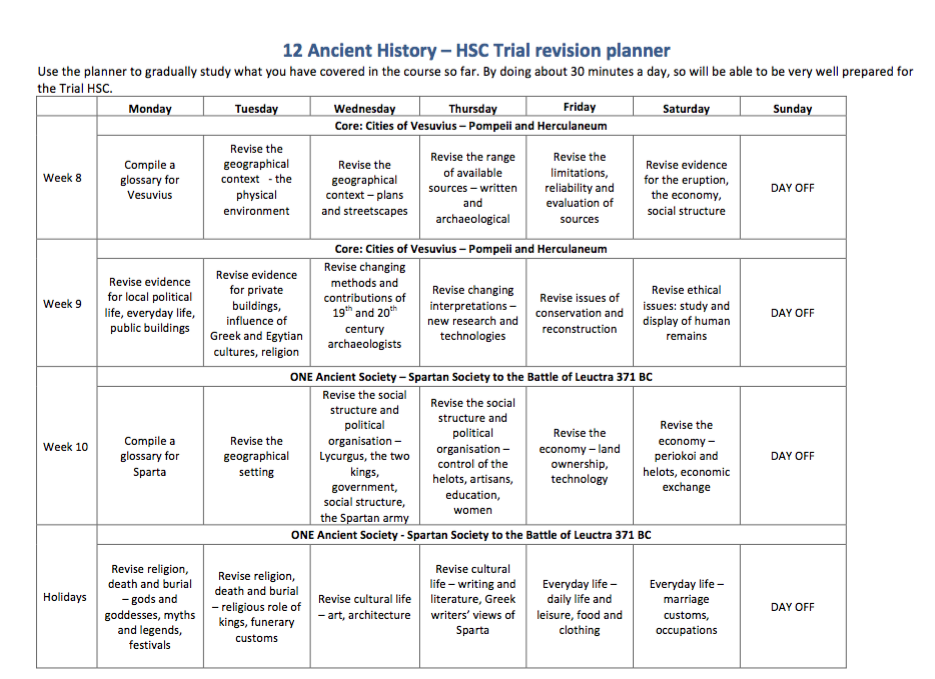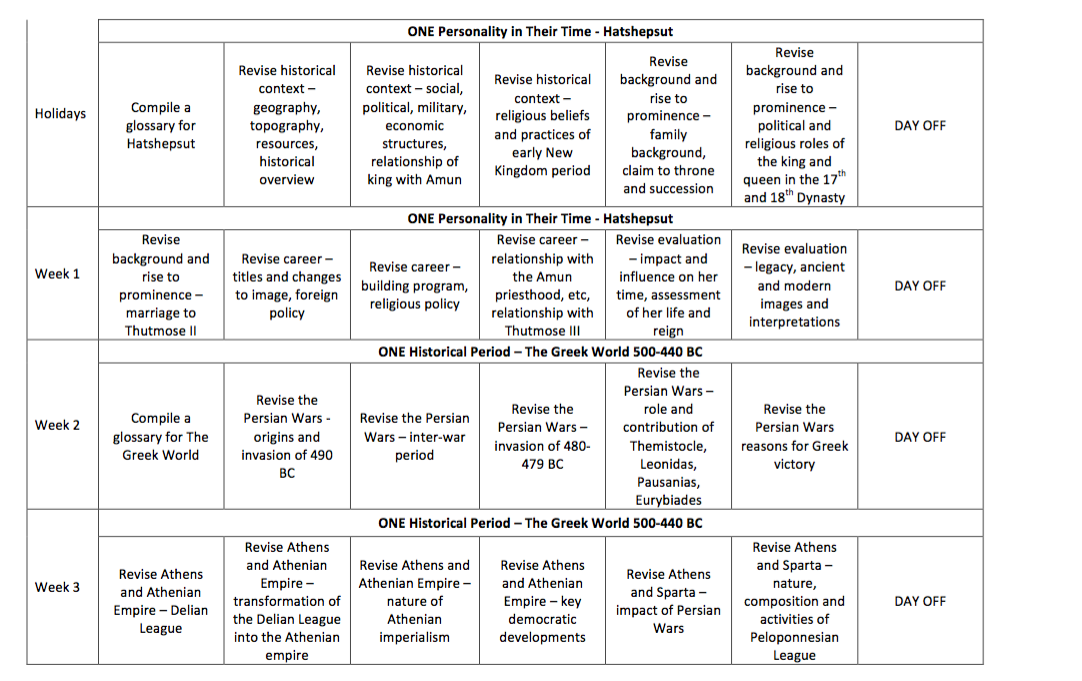|
For Stage 4 History, you may like to refer to a resource I created a few years ago (as mentioned in a previous post). Click here to examine the Syllabus Bite on Ancient India. As you progress through the topic you might like to use the glossary file below to help students develop knowledge of key terms. There is also a glossary quiz file, but you may like to break this up into a couple of smaller quizzes depending on the ability of your students.
Students must explore the beliefs, values and practices of ancient India. The handout below introduces a few key terms, provides a brief summary of beliefs, values and practices and outlines a short group work task.
The activity below allows students to examine the physical features of ancient India including mountain ranges, plains, deserts, wetlands, rivers and highlands. Students are required to complete a mapping activitiy to show the spatial distribution of these features.
A person of significance must be examined. Below is a short introduction to Ashoka including a few relevant key terms and a short cloze passage. For more detail on Ashoka examine my previous post Teaching Ashoka.
0 Comments
Ashoka appears in several of the HSIE syllabuses. There are ungoing debates about the place of India in History syllabuses. Discussions on the new draft Modern History syllabus have addressed the exclusion of some important topics and events related to modern India. This is despite the push with the 7-10 Australian Curriculum and new NSW syllabuses to include the Cross Curriculum Priority of Asia and Australia's Engagement with Asia. In terms of ancient India, Ashoka, an important personality in ancient India is actually included in three separate syllabuses: 7 History, Studies of Religion and Ancient History (new draft syllabuses). Most of the resources below have been designed for Studies of Religion, but you may like to modify them for a History class. History - Stage 4 - The Ancient World - The Asian World Depth Study - India The role of a significant individual in the ancient Asian world, for example ... Ashoka. Students:
Studies of Religion - Stage 6 (HSC) - Buddhism Significant People and Ideas
Ancient History (Draft syllabus) - Stage 6 (Prelim) - Investigating Ancient History - Case Studies Students investigate:
For junior History resources visit my blog post on Teaching Ancient India - Stage 4. http://www.hsieteachers.com/home/teaching-ancient-india-7-history For Studies of Religion, students could complete a research activitiy in pairs or groups on Ashoka. Each pair or group investigates one of: his pilgrimages, his missionary activities, monuments and stupas built by Ashoka, and his life as a model Buddhist. Students can then present their findings to the class (try to make sure there aren't too many groups or this kind of activity can become a bit drawn out).
The file below is a (very long) cloze passage on Ashoka. I know some people have issues with cloze passages, but they are a good way to ensure students are actually reading the texts provided, it is a change from the usual reading and answering questions, it provides a summary they can later read through, and it builds some basic literacy skills. Also, my theory is, providing a bit of variety is a good thing. Obviously don't use cloze passgaes all the time, but one here and there just means they aren't doing the same type of activity over and over again.
The Ashoka cut and paste activity is a good activity to help students organise their learning about Ashoka's impact on Buddhism in a hands on way.
Essay scaffolds may be useful for training students to organise their writing into structured paragraphs. These may be useful for a first draft of an essay. Obviously they don't provide enough space for the students to write a complete essay, but they may need them to write the key points that they will then expand on.
Guest blogger: Bruce BarclayThe recently released stage six draft modern history syllabus fails to clearly articulate a vision for the study of modern history in a globalised world. In its previous incarnation, the stage six syllabus at least paid lip service to areas of modern history which were not European in nature, i.e. India as one option. This final draft does not reflect the four options which were tabled to teachers who took the time to provide feedback to BOSTES previously. Teachers of this subject have been ignored with the release of the final draft.
The National Study and Peace and Conflict topic areas have been left relatively unscathed. However the inclusion of Iran into the national study topic area replaces India which is a lost opportunity. Similarly, the Peace and Conflict topic retains the main options, with the inclusion of Conflict in the Gulf 1991-2011, which replaces the UN as Peacekeeper. Essentially these two areas of study have escaped political influence. One of the real, if not the most problematic areas, is the core topic. Instead of utilising one of the options tabled at the consultation process, BOSTES has obviously bowed to political pressure and ignored the recommendations of the majority of teachers. World War One was a topic which although staid, at least had the advantage of being politically neutral and allowed teachers to engage in different national studies with no disadvantage to its students. For example a teacher of the USSR topic can build on students’ knowledge of the World War One topic. However as it stands, the core topic is Nazi Germany 1933-39 and teachers have to cover 9 detailed dot points taking up 60% of course time. To further compound the problem, teachers then need to teach another dictator, e.g. Pol Pot for 30% of the course. This begs the question: why is Nazi Germany deemed the most important topic for the core? Compounding the obvious bias, is that instead of removing Nazi Germany from the National Study it keeps Nazi Germany, but focuses on 1914-33. Clearly any teacher with half a brain will teach the German National Study first, then the Core/Nazi topic and if you haven’t got your fix of Nazi German history, you could finish with the European Conflict option for the Peace and Conflict topic. Already roughly 70% of the state teaches the Nazi option for the National Study so BOSTES wants the rest of the state to follow suit. As one person at the BOSTES consultation meeting at Hurstville remarked “That’s the end of the Soviet Union in every sense”. The USSR and for that matter the other options have been "relegated to the dustbin of history," to quote Goebbels, I mean Trotsky. It’s already working! Unlike the Ancient History course, BOSTES have removed the Personality topic from Modern History and replaced it with Change in The Modern World. I actually thought there has been a lot of change in the modern world in the twentieth century - that is why students love studying Modern History. BOSTES wants teachers to not only teach a personality, e.g. Gorbachev but link it to a time frame of nearly 70 years - The Changing World Order 1945-2011. This option has 19 dot points to cover, plus an evaluation of Gorbachev during the Cold War period. Furthermore, as a hat tip to the old UN as Peacekeeper topic, teachers have to assess the role and impact of the UN as international peacekeeper in relation to one trouble spot in the world, e.g. Somalia. Evidently the old inconsistencies of comparability between the ancient and modern course remain but are amplified, further alienating modern history teachers. If I was a student and had equal interest in modern and ancient history I would choose ancient for ease of content and variety. I hope that someone more technically adept than myself will be able to create a parody of the modern syllabus using snippets from The Downfall movie on youtube. I won’t even start on the exam specifications. Following the responses from similar, previous posts for Geography and Legal Studies, I have created a revision schedule for students in the lead up to HSC Trials for Ancient History. You will obviously need to modify it based on your options, but you can at least use it as a scaffold. Have a look at the previous posts regarding the study planner based on other subjects for more details.
|
Categories
All
Archives
May 2024
|
||||||||||||||||||||||||||||||||||||||||||||||||||||||||||||||||||||


